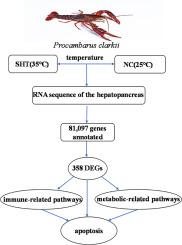Comparative Biochemistry and Physiology D: Genomics & Proteomics ( IF 2.2 ) Pub Date : 2020-12-03 , DOI: 10.1016/j.cbd.2020.100781 Lei Luo 1 , Jian-Hua Huang 2 , Dong-Liang Liu 3 , Shi-Gui Jiang 2 , Fa-Lin Zhou 2 , Song Jiang 4 , Qi-Bin Yang 5 , Yun-Dong Li 4 , Tao Li 6 , Li-Qi Tan 3 , Li-Shi Yang 2

|
Temperature is an important environmental factor in the living environment of crustaceans. Changes in temperature can affect their normal growth and metabolism and even cause bacterial disease. Currently, the potential anti-reverse molecular reaction mechanism of crustaceans during high-temperature conditions has not yet been fully understood. Therefore, in this study, we characterised the transcriptome of Procambarus clarkii using RNA sequencing and performed a comparison between super-high-temperature treated samples and controls. After assembly and annotation, 81,097 unigenes with an average length of 069 bp and 358 differentially expressed genes (DEGs) were identified. Among these DEGs, 264 were differentially upregulated and 94 were differentially downregulated. To obtain comprehensive gene function information, we queried seven databases, namely, Nr, Nt, Pfam, KOG, Swiss-Prot, KEGG, and GO to annotate gene functions. Transcriptome analysis revealed that the identified DEGs have significant effects on immune-related pathways, including lysosomal and phagosomal pathways, and that super-high-temperature conditions can cause disease in P. clarkii. Some significantly downregulated genes are involved in oxidative phosphorylation and the PPAR signalling pathway; this suggests a metabolic imbalance in P. clarkia during extreme temperature conditions. In addition, elevated temperature changed the expression patterns of key apoptosis genes XIAP, CASP2, CASP2, CASP8, and CYTC, thereby confirming that high-temperature conditions caused immune disorders, metabolic imbalance, and, finally, triggered apoptosis. Our results provide a useful foundation for understanding the molecular mechanisms underlying the responses of P. clarkii during high-temperature conditions.
中文翻译:

转录组揭示代谢失衡、免疫紊乱和细胞凋亡在超高温治疗克拉克原螯虾中的重要作用
温度是甲壳类动物生存环境中的重要环境因素。温度的变化会影响它们的正常生长和新陈代谢,甚至引起细菌疾病。目前,甲壳类动物在高温条件下潜在的抗逆分子反应机制尚未完全了解。因此,在本研究中,我们对Procambarus clarkii的转录组进行了表征使用 RNA 测序并在超高温处理的样品和对照之间进行比较。经过组装和注释,共鉴定出 81,097 个平均长度为 069 bp 的 unigenes 和 358 个差异表达基因(DEGs)。在这些 DEG 中,264 个差异上调,94 个差异下调。为了获得全面的基因功能信息,我们查询了Nr、Nt、Pfam、KOG、Swiss-Prot、KEGG、GO 7个数据库对基因功能进行注释。转录组分析表明,鉴定出的 DEG 对免疫相关通路有显着影响,包括溶酶体和吞噬体通路,超高温条件可导致P. clarkii疾病. 一些显着下调的基因参与氧化磷酸化和 PPAR 信号通路;这表明在极端温度条件下P. clarkia的代谢失衡。此外,升高的温度改变了关键凋亡基因XIAP、CASP2、CASP2、CASP8和CYTC的表达模式,从而证实高温条件导致免疫紊乱、代谢失衡,并最终引发细胞凋亡。我们的结果为理解高温条件下P. clarkii响应的分子机制提供了有用的基础。











































 京公网安备 11010802027423号
京公网安备 11010802027423号